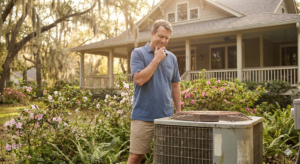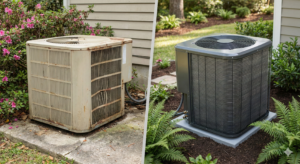Charleston homeowners know summer storms can roll in fast, bringing loud thunder, heavy rains, and bright bursts of lightning. While most folks think about staying dry or protecting their electronics, your HVAC system also faces risk when those storms hit. Power surges are more common than most realize, and they can do serious damage if you’re not prepared.
Your HVAC system works hard year-round to keep your home comfortable. During those muggy coastal summers, it runs almost nonstop. That makes it especially vulnerable when a sudden spike in electricity, like a power surge, hits your home. Understanding how power surges affect your system and what you can do to protect it will help you avoid costly repairs and keep things running smoothly.
Understanding Power Surges
A power surge happens when there’s a sudden spike in electrical current flowing through your home’s wiring. These surges are short-lived, but they can pack a punch. They often last less than a second but are strong enough to cause lasting damage to appliances and systems plugged into your electrical grid, including your HVAC unit.
Here in Charleston, these spikes are often caused by strong summer thunderstorms. When lightning strikes nearby, it can send extra voltage into the power lines connected to your home. But lightning isn’t the only reason surges happen. Other causes include:
Power returning after an outage
1. Downed power lines
2. Faulty or aging electrical wiring
3. Large appliances cycling on and off
Every time a surge hits your HVAC system, even a minor one, it can weaken components slowly over time. It may not fail right away, but the wear adds up. That makes it worth thinking about surge protection before problems start, especially in areas like Charleston where the weather has a habit of changing quickly.
Impact of Power Surges on Your HVAC System
An HVAC system is full of sensitive circuitry, electrical parts, and motors, all of which can react badly to a power surge. The effects of even one surge will vary depending on how strong it is, how your system is protected, and where the jolt enters the system.
Here’s what a power surge can damage inside your HVAC system:
– Control board: This is like the brain of your HVAC unit. A surge can fry it and stop the entire system from working
– Compressor: This is one of the most expensive parts to replace. A surge can burn it out completely
– Capacitors and contactors: These start up the motors. Too many power surges can wear them down until they stop functioning
If your HVAC system suddenly stops cooling or won’t turn on at all after a storm, there’s a good chance it took a hit. You may also notice signs like the fan not spinning, weird smells coming from the unit, or your thermostat not communicating with the system. Sometimes the damage is clear right away, and other times it can take a while for the effects to show up.
Getting to know these warning signs makes it easier to catch damage early before it gets worse. It’s always smarter to address problems now than deal with bigger breakdowns later.
Preventative Measures for Protecting Your HVAC System
Taking proactive steps to shield your HVAC system from power surges is a smart way to protect your investment. Below are some practical actions that can reduce the risk of damage:
1. Install surge protectors: These devices can be installed at the main electrical panel or at individual outlets. They work by sending extra voltage away from sensitive components
2. Use voltage regulators: These help maintain a steady voltage to your HVAC system, even when there are minor shifts in your home’s power supply
3. Consider a whole-house surge protector: This device gets installed at your main electrical panel and helps protect all your home’s electrical equipment at once
4. Schedule regular maintenance: Keeping your HVAC system in top condition includes checking its electrical connections and controls. A professional can recommend or install proper surge protection if your system doesn’t have it
By following these steps, you can give your HVAC system a better chance of standing up to electrical surges and avoid the stress and expense of big repairs.
What to Do After a Power Surge
If your Charleston home has just gone through a surge, and you think your HVAC system might have been hit, a quick response can make a difference. Here’s what to do:
– Turn off the system: Shut it down at the thermostat first. If you notice anything unusual or if it doesn’t respond, cut power directly at the breaker
– Look for obvious signs: Burnt wiring, a tripped breaker, or unusual smells may mean there’s internal damage
– Listen for odd sounds: Once you restart the system, humming, rattling, or grinding noises could signal something wrong in the motor or compressor
– Call a professional: Don’t keep the system running if you suspect something’s off. A technician can inspect the unit and make sure it’s safe and functioning properly
These steps will help reduce the risk of long-term damage. Waiting to address a surge-related issue could lead to a full system failure.
Safeguard Your Comfort Year-Round
Protecting your HVAC system from power surges is just as important as regular maintenance or changing your filters. Surges come without warning but preparing your system makes it easier to ride out those Charleston storms without losing comfort.
With frequent weather swings and seasonal thunderstorms, your HVAC system is more vulnerable than you might think. Taking a few precautionary steps now can save you a lot of trouble later. Being ready before the storm and knowing what to look out for after one gives you a strong plan to keep cool, even when the weather gets rough.
For Charleston homeowners looking to protect their HVAC systems from unexpected surges, working with an experienced HVAC company in Charleston is a smart move. Coastal Carolina Comfort offers dependable, customized solutions to keep your system running safely and efficiently through every season.


